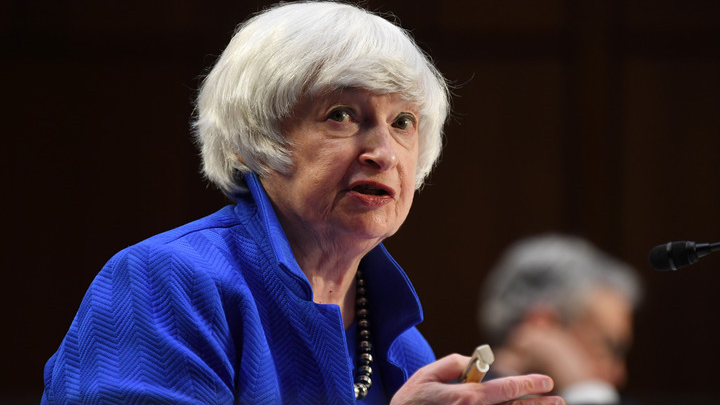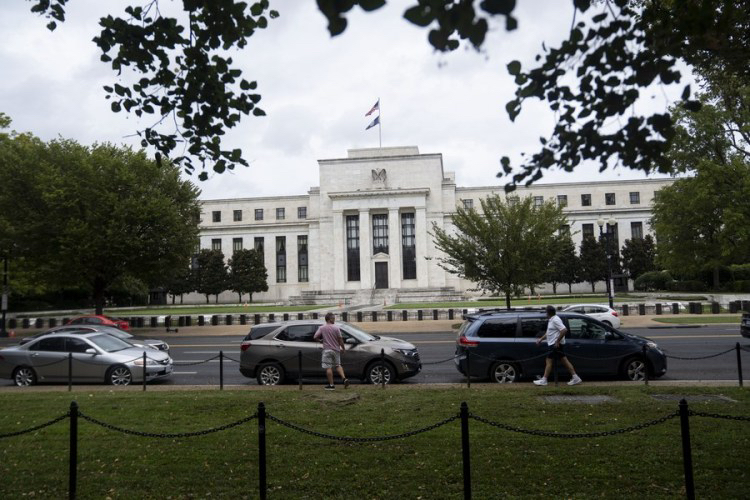
File photo of U.S. Treasury Secretary Janet Yellen. /Xinhua
File photo of U.S. Treasury Secretary Janet Yellen. /Xinhua
Editor's note: William Jones is a former White House correspondent for Executive Intelligence Review and a non-resident fellow of the Chongyang Institute for Financial Studies, Renmin University of China. The article reflects the author's opinions, and not necessarily those of CGTN.
A speech by U.S. Treasury Secretary Janet Yellen on April 20 asserting that the U.S had no desire to "decouple" from China since that would be "disastrous for both countries" and "destabilizing for the rest of the world" indicated that the U.S. President Joe Biden's administration might be seriously interested in reestablishing a relationship with China which has become seriously "frayed" by a belligerent U.S.
In addition, the administration has been working "overtime" in pressuring its "allies" in Europe and in the Asia-Pacific region to institute similar measures against China. Is Yellen now offering an "olive branch" to China or is this simply the other side of a Janus-faced policy to offer "carrots" and hide the "stick"?
On the one hand, it indicates some divisions existing within the administration over the present direction of China policy. Keeping a close focus on the world economy, Treasury Secretary Yellen is in a good position to see how the financial crisis is beginning to erupt and the negative effects of U.S. foreign policy both towards China and Russia on the state of the U.S. economy. Previously, she has been reined in by Biden's foreign policy gurus and forced to tone down her comments calling for a rapprochement with China. But as the economic crisis unfolds in the U.S., the concern about our damaged relations with our most important trading partner tends to increase.
The underlying dilemma of the United States is that, remaining a military "powerhouse," it feels it can still push its weight around. But, over the past four decades, it has transformed itself from a real industrial power to something of a "rentier nation" using the dollar to bolster its economy and has had to rely on convincing other countries in order to give the appearance of sufficient force to conduct its bullying.
It has also been weakened politically by alienating the great majority of the U.S. population who have failed to benefit by the U.S. transformation from an industrial to a "service economy," noting in particular the growing gap between the rich and the poor and the increasing racial tensions, exacerbated by the declining economy. The U.S. today is a veritable "house divided," a phrase used by the former U.S. President Abraham Lincoln to characterize the nation prior to the Civil War. Those who have suffered from this also find no solace in either the Democratic or the Republican parties, both of which are deemed totally subject to the corporate interests of the all-powerful military-industrial complex.

The U.S. Federal Reserve in Washington, D.C., the United States, September 22, 2021. /Xinhua
The U.S. Federal Reserve in Washington, D.C., the United States, September 22, 2021. /Xinhua
Not everyone is oblivious to this fundamental divide in the American society. Spending billions of dollars on a no-win war in Ukraine while cutting money for food stamps and medical care can only lead to a social explosion, the consequences of which no one can predict. Even some of the more far-sighted in the Biden administration are not unaware of the potential dangers here, and would like to reduce the economic tensions between the United States and China. While not foregoing for a minute their pretensions for maintaining the U.S. in the role of a world hegemony, they are aware that the economic consequences of an all too abrasive policy toward China could lead to serious complications for the United States.
The mixed signals emanating from Washington, however, are less indicative of a difference of opinion than a confusion in policy. There is the predominant myth that the U.S. can still muster the support of the world community, in spite of the difficulties it is having in even keeping its "allies" on board a policy that is just not in their own countries' interests. The unity of NATO is a mile wide and an inch deep, and the hundreds of thousands of people now out in the streets protesting in the NATO countries, indicate the internal instability of a policy that punishes their own population.
For the moment, we are condemned to see the shifting positions of the U.S. elites between a "good cop" and a "bad cop" scenario. But this will not last forever. The winds of change are blowing ever stronger, particularly in the financial realm. The recent spate of bankruptcies by major U.S. banks is a harbinger of future crises, leading perhaps to a recession or even to a new Great Depression. It is in periods like these that a radical change in outlook can be accomplished and a reevaluation of traditional methods and habits that no longer correspond to reality.
The world has long abandoned the "Washington consensus" and the effectiveness of "dollar diplomacy" dwindles with the reduced utilization of the dollar in international transactions. The American polity can and will come to terms with this and will no doubt profit from the change. If the U.S. could begin to concentrate on the conditions of Americans rather than going abroad "in the search for monsters to destroy" which the former U.S. President John Quincy Adams warned about, America could become great again - as a country revered for its prowess rather than despised for its belligerence.
(If you want to contribute and have specific expertise, please contact us at opinions@cgtn.com. Follow @thouse_opinions on Twitter to discover the latest commentaries in the CGTN Opinion Section.)